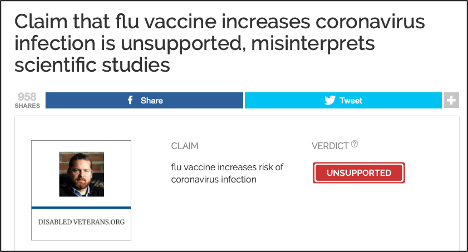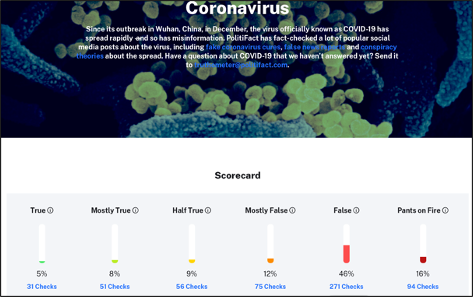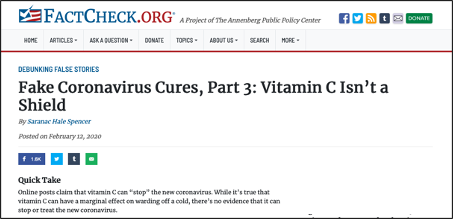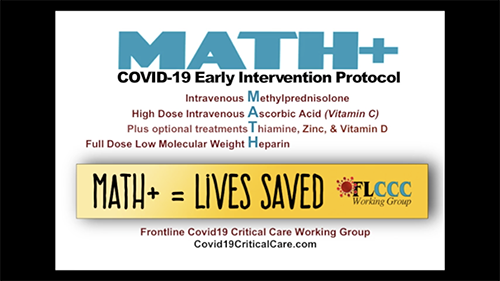Source:
https://www.anhinternational.org/news/who-s-fact-checking-the-fact-checkers/
Who’s fact checking the 'Fact Checkers'?
- Date:
- 2 September 2020
- Comments:
- 15
ANH-Intl investigates the fact-checkers and exposes conflicts of interest and disinformation
Content Sections
By Robert Verkerk PhD, founder, executive & scientific director and Melissa Smith, outreach & communications officer
Vitamin C is not an effective treatment for SARS-CoV-2, the virus responsible for covid-19. How do we know this? The 'fact-checkers' that now police our online world tell us so. In this new world order, if the information being shared on social media doesn’t meet the mainstream narrative, it’s declared fake and must be debunked. Regardless of whether or not it’s plausible, possible, true or false, the 'fact-checkers' find many ways to twist the information to meet the required narrative. By maintaining the illusion that there’s no effective way to treat Covid-19, the path is clear for people to line up with their sleeves rolled up when the novel Covid vaccines inevitably get green-lighted by the regulators and pushed to the masses, no doubt with the help of Google, Facebook and the rest of them.

Source: Health Feedback
In recent years, there’s been a global explosion of independent 'fact-checkers' across more than 50 countries spanning every continent. As the coronavirus pandemic unfolded, many existing 'fact-checkers' that had been focusing on 'fake news' in other areas, became overnight Covid-19 experts, and began to enthusiastically debunk individuals and websites espousing natural health options. Routinely cast as being neutral and free from bias, most 'fact checking' services are, in fact (excuse the pun), being bought and paid for by those seeking to dismiss claims that challenge the status quo.
What our investigation has revealed is that most of the people doing the fact checking are journalists, who you'd imagine are patently unqualified to put themselves forward as experts in the field of an international healthcare emergency caused by a newly-emerged virus.
It’s previously been claimed that there is no editorial oversight of 'fact checkers' at Snopes - one of 'the original' fact checkers - and that standard journalistic procedures (let alone scientific ones) aren’t followed when checking whether claims are true or false. In a recent case, Facebook 'fact checkers' labelled information from an anti-abortion group as false. When challenged, the labels were removed and Mark Zuckerberg later admitted there ‘clearly was bias’ in the censorship. When you need to do more than a simple debunking job, there are science-based fact checkers to draw on too - such as HealthFeedback (see below). They do things like go after peer reviewed journal articles and scientific discourse that doesn't fit with the mainstream narrative. Here's one example: HealthFeedback responds to posts on Facebook, DisabledVeterans.org and GreeMedinfo, claiming they are 'Unsupported'. The source is an interpretation by a retired US paediatrician published as a Rapid Response in the BMJ that expresses concern about possible negative interactions between flu jabs and coronavirus infection. Among the primary sources mentioned are articles published in the journals Vaccine and Clinical Infectious Diseases. Clearly, this kind of scientific debate - that could hardly be more topical as we move towards the flu season and the possibility of a quadruple whammy of flu jabs, Covid jabs and infection with flu and covid viruses - is not good for business.

Source: Health Feedback
It doesn't stop at 'fact-checking'. Google is ramping up its support of First Draft, set up to teach citizens how to identify and combat online misinformation.
So concerned about the exponential rise in online censorship and the defamation of their work by Facebook and associated pseudo-fact-checking organisations and websites, The Children’s Health Defense has filed a lawsuit against Facebook, Mark Zuckerberg and three 'fact-checking' agencies.
Just how effective 'fact-checking' actually is in changing people's opinions remains open to discussion. Some researchers have questioned the value of fact-checking ‘misinformation’ by big media organisations as it has the potential to spread the information to those who otherwise wouldn’t have seen it.

Source: Politifact
Checking the Fact Checkers
In our investigation, we’ve dug into some the better-known 'fact-checkers' out there with the aim of seeing just how independent or otherwise they really are. They all claim to be transparent in their funding, but transparency doesn't mean you're immune from conflicts of interest. In many cases, the funders tell you immediately what kind of bias you might expect. Only one of the organisations, Infotagion, states that the source information for their checks comes from the World Health Organization or governments.
Most fact checking organisations are members of the International Fact-Checking Network set up by the Poynter Institute for Media Studies. Amongst its funders are the Bill & Melinda Gates Foundation and Google, along with Omidyar Network.
Here's our shortlist of some of the most influential 'fact-checking' sites.
Health Feedback is part of Science Feedback. A not-for-profit organisation that says it verifies “…the credibility of influential claims and media coverage that claims to be scientific”. Its fact checkers are scientists who they say “…sort fact from fiction in health and media coverage”. Its list of funders includes Facebook and the Credibility Coalition whose funders also include Google, Twitter and Facebook.
Best known for its political oversight, Politfact has turned its attention to the pandemic in 2020. It’s mainly funded by the Poynter Institute whose funders include Facebook and Google. Its team of fact checkers are comprised of journalists and journalism students.
Started in 1994 by David Mikkelson Snopes is one of the first fact checking organisations. When it comes to funding, it claims “We are almost entirely funded through programmatic digital advertising sales, paid memberships, direct contributions, and merchandise sales.” However, Facebook is listed as a funder in previous years. 'Fact' checking is carried out by its team of journalists.
NewsGuard is a for-profit organisation originally set up to rate websites trustworthiness in the form of ‘nutrition’ labels. It too has turned its attention to the coronavirus pandemic in 2020. It's revenue “...comes from Internet Service Providers, browsers, search engines and social platforms paying to use NewsGuard’s ratings and Nutrition Labels in the news feeds and search results that they provide to their customers.”. They also use journalists to award website nutrition labels and undertake fact checking.
Full Fact is a UK based registered charity whose funders include Facebook, Google and Luminate (which was founded by Pierre Omidyar, the founder of ebay). They state they’re “…independent of government, political parties and the media”. Its fact-checkers are predominantly from a journalistic background.
US based FactCheck.org’s main focus has been the political forum, but like other 'fact-checking' organisations, it has now entered the coronavirus misinformation arena. This has led it to accepting funding from both Facebook & Google to cover Covid in 2020. Its 'fact' checkers are predominantly journalists.
This new kid on the block, based in the UK, was created specifically to combat coronavirus misinformation, by UK Member of Parliament, Damian Collins. Funded mainly by a variety of policitians worldwide, they do not share who is undertaking the fact checking. They are the only organisation that declare they fact check against information provided by the World Health Organization along with UK and other official government advice.
To give you an insight into how they work, we provide for you, below, a case study - one involving the highly controversial vitamin C, as found in oranges.
Case study on vitamin C rebuttal
For our case study, we use a FactCheck.org rebuttal of the usefulness of vitamin C in Covid – because it’s par for the course of the debunking jobs all so-called 'fact checkers’ have done on the use of vitamins C and D, or minerals like zinc, in Covid-19.
The rebuttal denigrates a simple, low cost vitamin, that’s also licensed as a medicine when used intravenously, that has a long but nonetheless troubled history of publicity around its use against viral infections. Its main problem is likely that the molecule itself can’t be patented; it’s been around much longer than humans and humans just can’t live without it, hence its essentiality as a nutrient.
But in megadoses, it has different effects on the body, ones that are now accepted as useful in fields as varied as cancer treatment and the treatment of sepsis. In fact (in the true sense), it is the appreciation of this body of work that’s provided the scientific rational for using or trialling vitamin C for prevention and treatment of Covid-19. This is supported by its proven role in immune health, its ability to kill infected cells and inactivate viruses through the production of extracellular hydrogen peroxide, through its inflammatory effects and its ability to act both as a pro-oxidant and an antioxidant. Regulation of these mechanisms is at the core of what is required to mitigate damage from the cytokine storm that is associated with severe Covid-disease and associated mortality.

Intravenous vitamin C - a taboo subject for many governments and health authorities
In a 'fact-check' debunking effort, there are typically 6 steps, as shown in our case study:
Step 1: Name and shame, while avoiding the science
FactCheck.org appears to try to get away with writing off vitamin C by ensuring its rebuttal of the vitamin’s potential use was published in February – at a time when Covid had barely arrived in the USA. The attack is pointed at social media posts from Andrew Saul from the Orthomolecular Medicine News Service (OMNS), which has a respectable editorial board. It contains no meaningful scientific discourse about the role of vitamin C either for treatment or prevention of Covid-19 disease. It also doesn’t comment on a number of helpful articles about the use of vitamin C (and other nutrients) in the management of severe respiratory diseases caused by viruses. Or ones written by eminent physicians or researchers on protocols intended to help make immune systems more capable of handling infection by SARS-CoV-2 like this or this. OMNS derives its information from published science, as well as being informed by the decades worth of clinical experience it has, and has had, access to through its network of orthomolecular doctors and practitioners. Even as far as journalistic standards go, the side swipe at OMNS could hardly be described as balanced.
Step 2: Use a non-scientist to write the article
FactCheck.org challenges Vitamin C’s usefulness primarily in Part 3 of Fact Check’s series on “Fake Coronavirus Cures”, the title giving a clue to the conclusion. It’s written by Fact Check staff writer Saranac Hale Spencer who it appears has a degree in philosophy, not science, has reported on political issues as a journalist for around a decade and has been writing for FactCheck.org since 2017.

Source: FactCheck.org
Step 3: Make the title count – let it do the debunking for you
The subject line coined for this 12 February piece is “Vitamin C isn’t a shield". A shield is a most common marketing representation for immune defense and is widely used by the pharmaceutical industry on licensed products. What’s disingenuous about this choice of wording, especially when coupled with the series title “Fake Coronavirus Cures” is that even now – seven months on – there is no single product that has been agreed by scientific consensus to be a ‘shield’ for the immune system to protect against Covid-19. That’s why lockdowns and social distancing are still being used by governments. The author knows this, stating in another article written 4 months later after the vitamin C rebuttal when debunking the uselessness of masks in public settings, “In the absence of a cure or vaccine for COVID-19…”.
Step 4: Avoid a discussion of evidence or science at all costs
What’s most astonishing about this debunking job is that there’s no real science in it whatsoever (perhaps not surprising given it’s written by a philosophy grad with a background in political journalism?) The most sciency bit just points you to the opinion of the very US authority that has been deep in with the drug companies for years – the Centers for Disease Control (CDC). In turn, it simply references the well established evidence of vitamin C reducing the severity and duration of the common cold. At a time when almost no one had Covid-19 in the USA so you could hardly expect data relating to the humble vitamin to be available. One comprehensive US study published in Clinical Infectious Diseases in 2000 found that 34% of hospitalised patients with common cold were infected with human coronaviruses, the assumed cause of the illnesses. So in that light, looking for treatments that improve common cold doesn't seem such a bad place to start.
Hale Spencer’s swipe at the OMNS is interesting as she uses no evidence to back up her view. Presumably making slanders including to anti-vac sentiments is sufficient.
For the next part of this case study, we need to divert briefly from vitamin C to see how governments handled another new disease – bird flu, back in 2005.
Step 5: Don't learn the lessons of history
This little snippet from history serves the purpose of explaining how the mainstream narrative may have little to do with science - and a lot to do with the cosy relationship between governments and drug companies.
Back then (in 2005), lack of evidence of efficacy didn’t stop governments like that of George W Bush stockpiling anti-viral drugs like Tamiflu and Relenza for bird flu (influenza A (H5N1), based on advice from the US National Institutes of Health (NIH), with no evidence it would save lives. Just months later, there was growing evidence that resistance to Tamiflu would be a major issue. That didn’t stop government’s stockpiling. Nor were governments or the anti-viral drug maker, Hoffman LaRoche, transparent about the common, debilitating side effects of the drug. In January this year, a US law firm initiated a case against Roche alleging it knew that its product wouldn’t work in the event of a flu pandemic. It made a cool $1.5 billion out of sales to the US government, apparently fraudulently. The courts have yet to decide – but let us, in the current pandemic, be more mindful than ever before of how pharmaceutical interests can exploit pandemics for their exclusive benefit – and not that of societies, or taxpayers. No surprise that FactCheck.org has nothing to say about Roche misleading governments, the public or taxpayers.
Step 6: Ignore information that might save lives if it doesn’t suit your paymasters
Stunningly – there’s been no FactCheck.org update on vitamin C despite all the interest among critical care doctors. Clearly the February debunking piece continues to serve its purpose. No consideration was given, for example, to Dr Richard Cheng’s first communications of evidence of clinical success in China, along with a plausible basis for its use, coupled with minimal side effects. Or that the use of intravenous vitamin C was clearly of sufficient interest to the critical care community by April for an article to be published in the journal Critical Care on a planned placebo-controlled Chinese trial using high dose (24g/d) intravenous vitamin C. The results of this trial are expected in September, although Dr Cheng stated in OMNS on 16 August that the authors are having great difficulty finding a journal that will publish their findings. FactCheck.org also makes no mention that there are 13 other trials on vitamin C in relation to Covid-19 reported on the NIH site ClinicalTrials.gov that are currently actively recruiting or preparing to recruit Covid-19 patients. And of course no mention of the UK trial about which UK health journalist Jerome Burne reports, after interviewing the lead researcher involved. The trial shows that where rather low doses of intravenous vitamin C have been used in Covid patients in a UK intensive care unit, deaths were among the lowest in the country - 8% below average at 34%.
One of the most stunning things about this pseudo-fact-checked world in which we now live, one in which any idea that is not consistent with a specifically engineered narrative coming out of the mainstream, is that it feels unmoved to communicate information that might save lives - if the information may harm certain business interests. It's a simple formula, we presume, in which business interests are put in front of the those of people, and that presumably explains how we've moved into a world where it is accepted that prescription medicines are among the leading killers in society.
The plight of the US critical care doctors who are saving lives day in day out is a case in point. Take their detailed MATH+ protocol for prevention and treatment of Covid-19 at the different stages of infection – that they have now no option but to release on the Internet, both through the East Virginia Medical School at which lead clinician Prof Paul Marik is based, and a website for other frontline doctors who’ve co-developed the protocol with Marik and are successfully using it in their own facilities.

FactCheck.org is mute on the fact that these doctors are being stonewalled by the NIH and other US health agencies. That’s because vitamin C, along with vitamin D, zinc, melatonin and other nutrients are central to their protocols – all of which have apparently saved almost every life to which they have been administered.
Here are some facts that might save your life or that of a loved one
Since you won’t get life-saving information from FactCheck.org – and you may find the in-depth protocol too complex as it's designed for emergency medics, here’s Prof Paul Marik’s life-saving summary. It evolved from the work he did to develop a protocol using vitamin C and steroid combination therapy for sepsis, which has clear similarities to severe infections with SARS-CoV-2.
Take-homes
Covid is a new and complex disease that’s appeared in a world in which science is twisted in a direction that generally suits those with the deepest pockets. So-called ‘fact-checking’, it turns out, isn’t really fact checking at all. It’s a process that’s moderated largely by journalists and other non-scientists who, frankly, couldn’t be expected to come to grips with the uncertain, continually changing evidence and science around Covid-19 disease, or the effectiveness or otherwise of strategies that aim to deal with it.
When incredibly profitable private companies like Google and Facebook who benefit from pseudo-fact-checking actually fund these services, using non-scientists to provide views on complex, uncertain and rapidly evolving science, it becomes a clear conflict of interest. One that everyone appears silent on for the time being.
Our take-homes are as follows:
- Don’t trust the fact checkers if you want facts
- Be aware that important missing facts are rife on ‘fact checking’ sites, including ones that might save your life
- Recognise that a lot of information on Covid-19 is not as black and white as some people and organisations like to make out. There is huge uncertainty over it, and the evidence is a moving feast. Also, complex diseases often require complex protocols, so just because one trial says one nutrient (or drug) doesn't work in isolation, it doesn't mean it doesn't work in combination therapy.
- Follow the money – understand who benefits from the rapidly expanding, pseudo-fact-checking racket, with many organisations having a clear conflicts of interest with the 'fact checkers' on which they rely
- Build your knowledge and understanding around Covid-19 by harvesting, deliberating and interrogating information from multiple websites and other information sources, especially those that are based on known facts, existing evidence, plausible rationales – yes, science.
On this final point, we find it interesting that our views, as expressed on the numerous articles on our website including in our Covid Zone, tend to share a lot in common with other scientists, including, to name just two, Prof Carl Heneghan from the Centre for Evidence-based Medicine at Oxford University, and Nobel laureate Prof Michael Levitt from Stanford who expresses his views and analysis regularly on Twitter.
‘Good science’, one of our two guiding principles over the last 18 years (the other is ‘good law’) is, it seems, not that popular these days.
No comments:
Post a Comment
Note: only a member of this blog may post a comment.